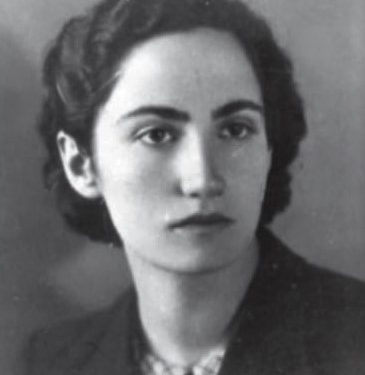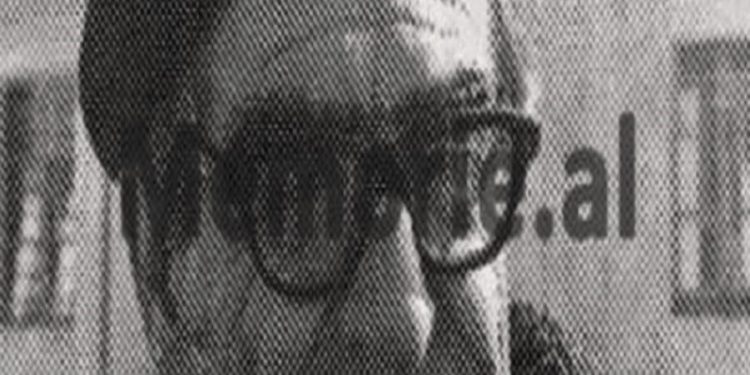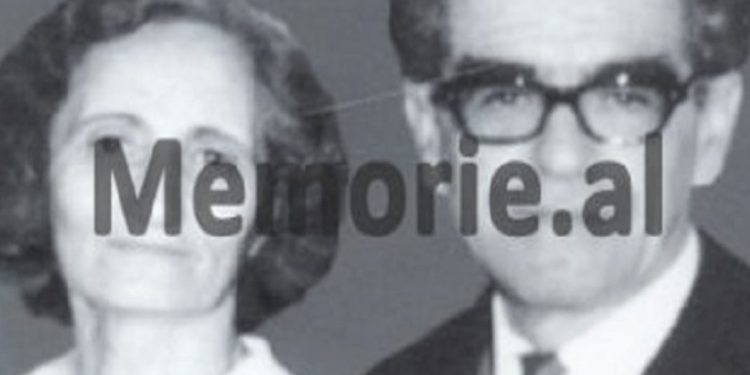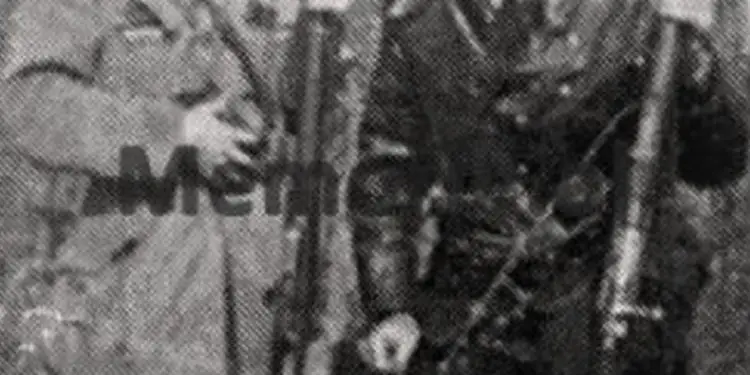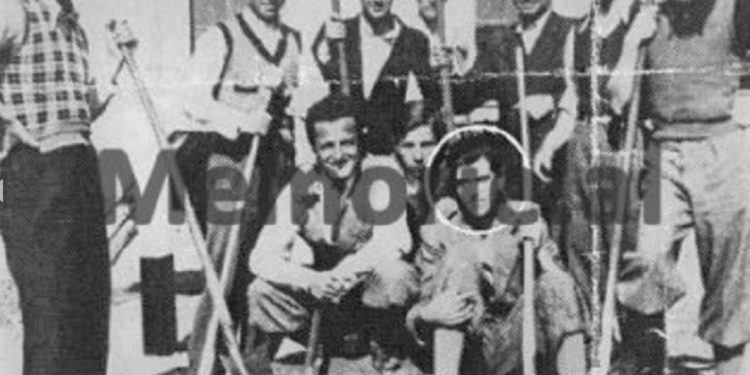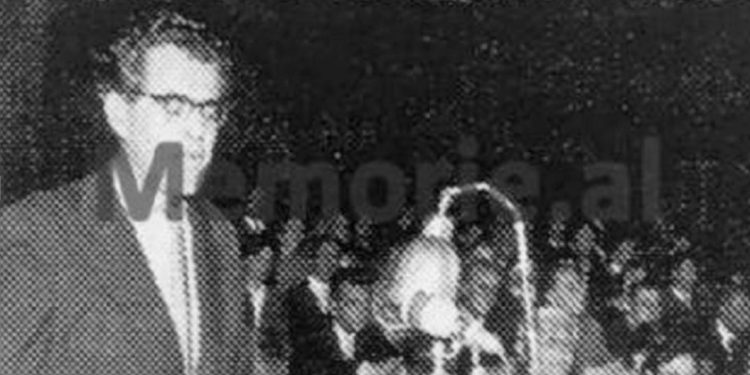By Selfixe Broja (Ciu)
The first part
Memorie.al / Selfixhe Ciu (Broja) was born in 1918 in the city of Gjirokastra, in a wealthy citizen family, as her father, Ibrahim Ciu, was a large merchant. After finishing the unique school, she continued her studies for two years at the Gjirokastra High School, but after its closure, she completed them at the Tirana high school. She had a passion for literature and at that time she published the first poems and stories in the press of the time, which she signed with the literary pseudonym “Colombia”. In 1935, (when he was 17 years old), after publishing his first poem in the magazine “Populli”, “Bota e Re”, “Java”, “Diana”, “Drita”, “Stypi”, etc. In the high school of Tirana, she embraced communist ideas, through her close friend Zef Mala, Chairman of the Communist Group of Shkodra, and in the late 30s, Selfixeja, had a friendship with Qemal Stafa and Vasil Shanto, (with whom she introduced Zef Mala) and was accepted as a member of the Communist Group of Shkodra, although she was a student in Tirana. In 1938, Selfixheja went to Italy, to the University of Florence, to the Faculty of Literature, where at that time Qemal Stafa, Nikolla Shurbani, Ramadan Sokoli, Andrea Varfi, Musine Kokalari and her cousin, Qibrie Ciu. After returning to Albania, she reconnected with the communist groups and after the formation of the NPSH, she was sent to Shkodër to work with the Anti-Fascist Women’s Organization, was arrested by the Italians and kept in Tirana prison for 11 months. After the end of the war, her husband Xhemal Broja was appointed to the Arts Committee in Tirana, and Selfixheja as a journalist in the Ministry of Agriculture, where the newspaper “Bujku u Ri” was published. On March 23, 1946, Xhemal and Selfijën were expelled from the Party (as anti-Yugoslavs) calling them “enemies of the people and agents of the American mission” and on January 17, 1947, they were interned in Gusmar of Kurveles, working in agriculture. After the break with the Yugoslavs in ’49, they returned them to Tirana, where Selfixheja, after working for a short time in the Ministry of Education, resigned. In 1966, Xhemal and Selfixhe were exiled again for six years in Gradishte, Lushnje, accusing them of “a decadent spirit in Art and Literature”. After that, the screening of the film “Detyre e Posaçme”, where Xhemali had one of the main roles, was also banned. They returned to Tirana in 1971, where Selfixheja was locked up at home, while Xhemali, after working for some time at the Kinostudio “Shqipëria e Re” as an administrator, was sent as a worker to the Agricultural Farm “Gjergj Dimitrov”. They were also deprived of the right to publish, since they were both expelled from the Writers’ Association in ’66. Being monitored by the Security, they were locked in the house, where Xhemali studied, writing memoirs and plays. Xhemali passed away in 1976, and Selfixeja in 2003, at the age of 85. They left two daughters: Sashenka and Mary. In 1998, Selfixheja wrote her memoirs, publishing them in the book “Tallazet e jetës”, from which Memorie.al has selected and published some of them, in this two-part article.
-The confession of an internee, about the night of her arrest-
THE SECOND INTERNSHIP
“In the afternoon of December 14, 1966, neighborhood activists informed us that the next day a special meeting would be held in our block and that we had to definitely participate.
My husband informed me that I was sick, while he was engaged in a fixed-term job and was short on time, and he could never come.
“Why was that?” – we both talked. But I, being sick, and my husband, preoccupied with the work at hand, did not push the thought of the meeting any further.
We fell asleep late. Towards dawn, a loud knock on the door woke us up. Every knock at unusual hours always evokes a bad premonition: such was the impression that seized us at that moment. Moreover, this was also related to the fact that for three months, the eldest daughter was assigned to work in Shkodër. This first parting with him gave us not only sadness and nostalgia, but also some anxiety. The distance itself evokes unexpected things, for better or for worse, but when it comes to parents, the evocation of evil mostly lives in their souls. Here, at that moment, we only thought about some problem of hers. We held our breath and waited for the knock to be repeated, while the instinct of self-preservation gave us a faint hope that the knock might belong to the neighbor. But the second knock, accompanied by the wake-up call: “Police”, destroyed all illusions. My husband, half naked, went out to open the gate, while I, with a frozen heart, nourished the illusion that there was no misunderstanding. But the ominous question: “Xhemal Broja”? so destroyed that illusion.
– “You and your friends are interned. Do you have other family members”? – communicated a stern voice.
– “My daughter is here and the other is working in Shkodër” – he answered in a colorless voice.
– “Girls are not included in this measure. Just prepare the spoils as soon as possible, because we don’t have time to wait”, added the State Security Operative, giving us a cannibal look. Was it a coincidence or was the man with the physiognomy chosen, it remains forever indelible in my memory…?!
With a spirit of revolt, I asked:
– Why are we interned?
– “You, the few words, because that tongue took you by the neck”, – he growled at me.
– Did we talk? Where and when…? If there are laws, I should be punished based on facts and not slander or malicious conjecture.
– “The neighborhood that made the decision knows that”, – he answered.
– The neighborhood…? – I said, more than surprised, and addressed a member of the leadership of the Front, who was somewhat aloof.
– You from the neighborhood asked for our deportation? Why? Is it for our honesty, correctness, or for the sympathy and respect we enjoy from the residents?!
The question was not answered by any of the four in charge of executing an order.
We were not aware that the meeting the day before was provoked for this purpose. A delegate at that meeting, Gafur Çuçi (member of the Central Committee of the ALP), who neither knew us nor we knew him, presented the charges prepared above, camouflaged as a block-based measure, which consisted of:
- We were once again exiled (although for that measure of exile twenty years ago, by decision of the Central Committee, we were recognized as innocent)!
- I had written in a decadent spirit (while those writings, published in our notebooks or magazines, of course, had passed through the sieve of the respective editors).
- After propagandizing about the Tirana Conference of 1956 (actually we were in 1966), this fact refutes this accusation, because if they had had such data, the wave of persecution would have included us in time, not after ten years, especially since our positions were shaky!
Regarding the measure against us, I am opening a parenthesis. Given that in the intellectual environment there were indignant whispers about this event, in general and in particular for both, either for consideration as front-line fighters for liberation from the occupier, or for consideration as people with sound moral and civic principles, also for the contribution given as writers and commitment to the smooth running of the art and culture sector, in general, to camouflage the predicted bluff, two or three days after the event, in a provoked conference with intellectuals, the envoy of the Central Committee, Manush Muftiu, among other problems, about the event in question, he expressed himself in this way: “If Xhemal Broja had to follow his wife, we are not to blame”! This statement of a first-hand personality could not help but take place in that environment, but also in the wider spread. Could he be suspected of lying, so brazenly? To neutralize that spirit of defeat, they sacrificed one of us.
After presenting the above-mentioned accusations, it was requested to discuss and according to the practice in cases of this nature, to give the color that the decision was taken from the base (measure), two or three instructed elements proposed the measure of our internment, as unwanted people in Tirana: “Oh, what a tragedy-comedy was being played to deceive the people who were under dictatorial pressure!” In reality, the decision to intern us was an act of the Deportation – Internment Commission, not the meeting the day before. This is made clear by the designation of the district where we would go, the commitment of the apartment as early as a week ago, the vehicles for transportation, as the drivers themselves stated.
The repetition of the order: “Hurry up, collect the things because we don’t have time to wait”, shook us from that state of confusion. The 15-year-old girl, shocked, in tears, still in her nightgown, unable to conceive the reason for the horror that was happening to her head, turned her gaze from one to the other to find support from her parents. One of the eyes addressed him: “Put yourself together, get dressed and lend a hand to collect the things.” That tone of tenderness caught my attention: “How is that possible?! Or maybe he is a parent and imagining his child in similar circumstances, he instinctively came to life in that “man”. But my internal monologue was interrupted by his question:
– “Where will the girl stay”?
– At my brother’s, at my sister’s or where they can keep him, – I answered.
– Go to your aunt once, – I told the girl, – then decide.
Like a somnambulist, she tossed and turned, like a baby looking for shelter, or did she want to become a shelter for us?
– “Get dressed and I’ll come and escort you”, – said the same person – “Where is your aunt’s house”?
– The girl gave us a frightened look, but after our approval she left accompanied by him. We trusted the “man” of that moment. While finishing the load, the girl returned accompanied by my sister, who was doubled over from the shock. Parting with him, we left him the message with an expression of indescribable leerness. Her terrifying horse, which could have tamed even the savages of the forest, left the executioners of the horror indifferent. When she jumped into our arms as if she wouldn’t let go, the stern voice of the Security Operative shouted:
-“Quick, we don’t have time to wait”! – while the neighbor, who asked in alarm: “What happened?” – I growled at him: – “You go inside and shut up”!
The car was put into gear and we, the parents, had to forcefully wean our daughter. We broke up!
The sound of the car was neutralized by the neighing of her horse: “O Mami, O Babiii…”! That transcended the limits of pain and describing the depth of the night, heralded a ghastly dawn.
***
Deep opportunity. In traversing the streets of Tirana, the haunting of the first moments was giving way to a rigid concentration. The catastrophe was now unfolding with all its tragic weight. “Where were they taking us? Would we have the strength to face it and what was waiting for us? What about the girls…?
The vehicle stopped in front of the Textile Factory square. A line of cars, stopped there first, caught our attention. Their load of household furniture and accompanying Security elements gave us a sense of the meaning of the analogous conditions. Among the people scattered around, or inside the vehicles, we also noticed acquaintances, whose heterogeneous composition disoriented us more. What was happening? What had given rise to this inconceivable action? Or was it simply a campaign, time after time needed to scrutinize the people and woe to which the number falls to represent the example? Meanwhile the sacrifices were made!
As we were later informed, that screeching had the effect of inducing fear in the weak, so much so that, for days on end, the streets were emptied of passers-by, huddling early in the houses. While in the general atmosphere, with all the demagoguery exercised around this event, the spirit of disagreement and indignation of the healthy element remained invincible.
***
After the latecomers arrived at that station, the line of cars, like a solemn procession, started its journey south. In our car they also put a young man, P. Guga, and the entire luggage. His physiognomy reflected extreme bitterness. My husband had some acquaintance with him and now we were sharing the same fate. The greeting we exchanged was miserable, frozen, like our very soul, dark like the night of our future.
He, at the peak of mental and physical strength, in the stage of professional and cultural maturity, in the period when intimacy takes on a deep meaning and life promises hope and light more than ever, right now the ax hit him in the trunk. We, tired of the vicissitudes of our life over the years, in the period when time could help our will to heal past wounds, this blow would shake us deeper. Released in the lap of despair of the first moments, both of us lacked the strength to relieve each other. A deep meditative silence was sheltering our gloomy thoughts.
After a few hours of anxious travel, near the destination, Lushnja district, the group split in different directions. We were included in the group of four families and two singles. The sector assigned to us that a new sector, raised in the deepest swamp of the district. In the past, that piece of swamp, covered with endless reeds, leeches, snakes and mosquitoes, was called: Saint Friday. Currently, it was simply called “Sector”, while the internees who populated it, among themselves, had baptized it “the capital of the reaction”, because there the majority consisted of the families of former high officials, executed or on the run, of Bajraktars, who had dozens and dozens left during the fighting, shot with or without trial, fugitives in the last period of the War, or after it, etc. Some of them who were stationed there among the first, when they compared the current situation with that of the beginning when they were immersed up to their throats in mud to dry that swamp, addressed us with a kind of irony: “You have now come as if for tebdil- wow, you have no reason to complain…”! Bitter irony!
***
When we arrived it was almost evening. Each was shown the assigned apartment. In one of the entrances, to the same apartment, we were assigned three families, actually three couples, because fortunately, the children were generally not included in this measure and they remained in Tirana. The other couple was placed in one of the barracks intended for the entire mass of internees, while the two bachelors, one an educator and the other an economist, although political convicts, were placed in the silo that included ordinary convicts from the scum of society. Memorie.al
The next issue follows




